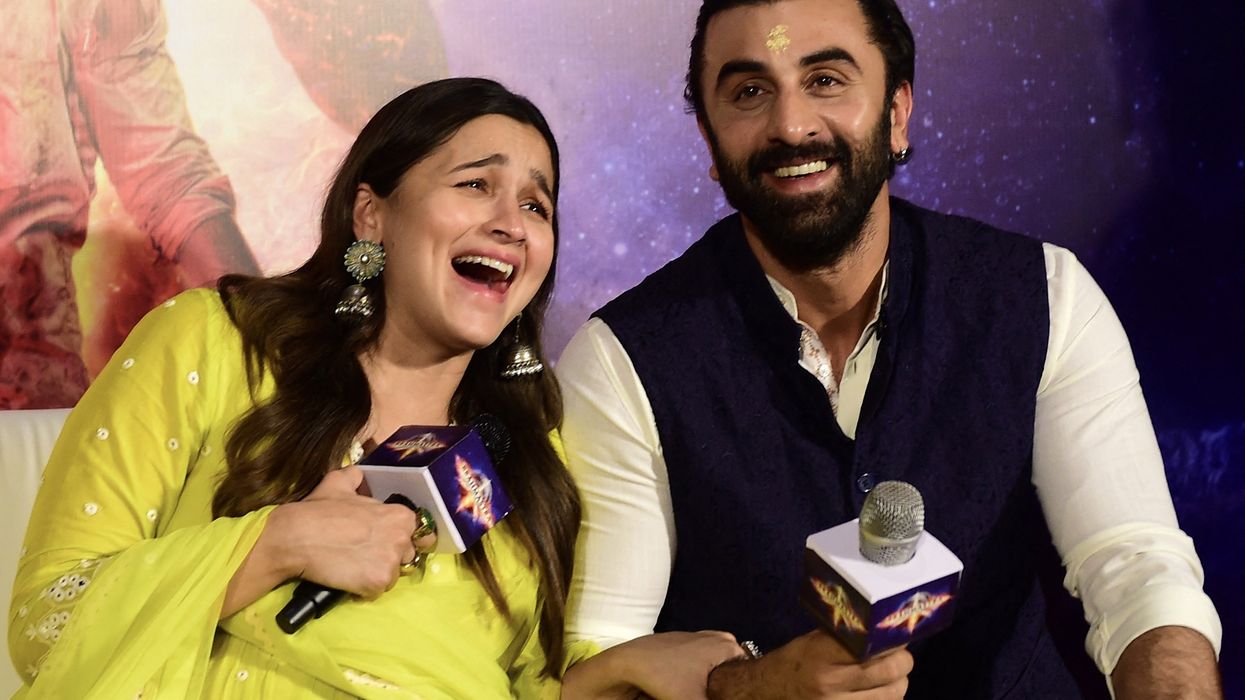Actors Ranbir Kapoor and Alia Bhatt walked away with top acting honours at the 69th Filmfare Awards for their roles in Animal and Rocky Aur Rani Kii Prem Kahaani while Vidhu Vinod Chopra's 12th Fail won the Black Lady for Best Film and Director.
The 69th Hyundai Filmfare Awards 2024 with Gujarat Tourism was held in GIFT City, Gujarat. The festival concluded on Sunday with an awards ceremony that was hosted by Karan Johar, Ayushmann Khurrana, and Maneish Paul.
Bhatt's co-star Shabana Azmi in Rocky Aur Rani Kii Prem Kahaani won the Best Supporting Actress award but the film's lead star Ranveer Singh lost the trophy to Ranbir Kapoor. The Karan Johar-directed film also won the trophy for best dialogues as well as best choreography for "What Jhumka?".
Vicky Kaushal, who was also nominated in the best actor category, won a best supporting actor trophy for Shah Rukh Khan-starrer Dunki.
Despite delivering the three biggest hits of the year in Pathaan, Jawan, and Dunki, SRK was missing from the winners' list despite securing a nomination in the best actor and film categories. Jawan, however, won Filmfare for best VFX and action.
Animal, one of the most controversial but successful films of the year, not only won Ranbir the Best Actor trophy but bagged trophies for Best Music Album, Background Score, and Best Playback Singer to Bhupinder Babbal for "Arjan Valley".
12th Fail star Vikrant Massey won best actor (critics) Filmfare. The film also won in the screenplay and editing categories.
Best Actress (critics) trophy was shared by Rani Mukerji (Mrs Chatterjee Vs Norway) and Shefali Shah (Three of Us). Three of Us director Avinash Arun Dhaware won the trophy for the film's cinematography.
Manoj Bajpayee-starrer Joram won the Best Film (Critics) award as well as Best Story recognition for Amit Rai and Devashish Makhija.
Amitabh Bhattacharya's "Tere Vaaste" from Zara Hatke Zara Bachke won best lyrics while Shilpa Rao was recognised as the best female playback singer for Besharam Rang from Pathaan.
Kaushal's film Sam Bahadur won Filmfare for best production design and costume design.
Best Debut Director went to Tarun Dudeja for Dhak Dhak and Best Debut Actor male to Aditya Rawal for Hansal Mehta-directed Faraaz.
Alizeh Agnihotri won the trophy for Best Female Debut for Farrey at the awards show where filmmaker David Dhawan was honoured with the lifetime achievement award.
The gala night also saw the presence of celebrities such as Kareena Kapoor, Aparshakti Khurana, Karishma Tanna, and Kartik Aryan. Ranbir, Sara Ali Khan, and Kareena also performed at the event.
Here’s the complete winners list:
Best Film (Critics) - Joram
Best Actor in a Leading Role (Male) - Ranbir Kapoor (Animal)
Best Actor in a Leading Role (Female) - Alia Bhatt (Rocky Aur Rani Kii Prem Kahaani)
Best Actor (Critics) - Vikrant Massey (12th Fail)
Best Actress (Critics) - Rani Mukerji (Mrs Chatterjee Vs Norway) and Shefali Shah (Three Of Us)
Best Director - Vidhu Vinod Chopra (12th Fail)
Best Actor In A Supporting Role (Male) - Vicky Kaushal (Dunki)
Best Actor In A Supporting Role (Female) - Shabana Azmi (Rocky Aur Rani Kii Prem Kahaani)
Best Music Album - Animal (Pritam, Vishal Mishra, Manan Bhardwaj, Shreyas Puranik, Jaani, Bhupinder Babbal, Ashim Kemson, Harshwardhan Rameshwar, Gurinder Seagal)
Best Lyrics - Amitabh Bhattacharya (Tere Vaaste - Zara Hatke Zara Bachke)
Best Playback Singer (Male) - Bhupinder Babbal (Arjan Vailly - Animal)
Best Playback Singer (Female) - Shilpa Rao (Besharam Rang - Pathaan)
Best Story - Amit Rai (OMG 2)
Best Screenplay - Vidhu Vinod Chopra (12th Fail)
Best Dialogue - Ishita Moitra (Rocky Aur Rani Kii Prem Kahaani)
Best Background Score - Harshavardhan Rameshwar (Animal)
Best Cinematography - Avinash Arun Dhaware (Three Of Us)
Best Production Design - Subrata Chakraborty and Amit Ray (Sam Bahadur)
Best Editing - Jaskunwar Singh Kohli - Vidhu Vinod Chopra (12th Fail)
Best Costume Design - Sachin Lovelekar, Divvya Gambhir and Nidhhi Gambhir (Sam Bahadur)
Best Sound Design - Kunal Sharma (Mpse) (Sam Bahadur) and Sync Cinema (Animal)
Best Choreography - Ganesh Acharya (What Jhumka? - Rocky Aur Rani Kii Prem Kahaani)
Best Action - Spiro Razatos, Anl Arasu, Craig Macrae, Yannick Ben, Kecha Khamphakdee, Sunil Rodrigues (Jawan)
Best VFX - Red Chillies VFX (Jawan)
Best Debut Director - Tarun Dudeja (Dhak Dhak)
Best Debut Male - Aditya Rawal (Faraaz)
Best Debut Female - Alizeh Agnihotri (Farrey)
Lifetime Achievement Award - David Dhawan
R.D.Burman Award for Upcoming Music Talent - Shreya Puranik (Satranga-Animal)




